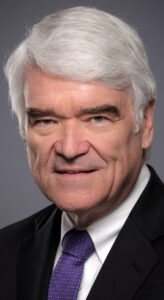Texas law schools are being considered as possible locations for a new system of business courts created earlier this year by the Legislature and set to begin operating next September. The Supreme Court of Texas is addressing logistical and substantive issues as it writes rules for the 10 district courts and the first intermediate appellate court with statewide jurisdiction.
Texas A&M University School of Law in Fort Worth has expressed interest, said Chief Justice Nathan Hecht.
“All of the law schools have been approached — ‘Is this something you would want to do for the benefit of your faculty and students,’” said Hecht. Housing the courts, which were created to handle complex business disputes at the trial and intermediate appellate stages, would provide students the opportunity to watch litigation in action and possibly work as interns.
The law creating the trial-level courts requires two judges be assigned to each of five urban regions but provides flexibility about where they sit. The judges may exchange benches and act on each other’s behalf in any matter pending before the court. The new Fifteenth Court of Appeals is based in Austin but may transact its business in any county.
The logistics of the new courts — where the judges are going to have their chambers and courtrooms — are among the many issues facing the Supreme Court as it works to get the courts up and running by next September. The court also is working through difficult issues related to jurisdiction and transfer of cases as well as setting filing fees to sustain the courts.

The Texas Lawbook recently spoke about the implementation with Hecht, members of the advisory committee that drafted proposed rules and chief justices of two courts of appeals already identifying cases for transfer to the new court of appeals.
Prompted by business interests and backed by the governor, the 88th Texas Legislature enacted two bills creating the courts after several sessions of considering but not passing similar legislation. The laws represent a radical departure from existing district courts and intermediate courts of appeals, which hear cases from a defined judicial region. Unlike the state’s system of electing judges, business court trial judges will be appointed by the governor, with the advice and consent of the Senate, for a term of two years and may be reappointed.
House Bill 19 creates the Business Court Judicial District, which includes all counties in Texas. The law provides the trial courts with jurisdiction over specified actions in which the amount in controversy exceeds certain minimums or which involve publicly traded companies regardless of the amount in controversy. Lawmakers funded two district judges each in the Dallas, Fort Worth, Austin, Houston and San Antonio regions.
Senate Bill 1045 created the Fifteenth Court of Appeals District, also composed of all counties in the state. The five justices would initially be appointed by Gov. Greg Abbott and stand for election on the statewide ballot. The court will hear appeals of cases from the business court and cases involving state government.
Parsing the Statute

Marcy Hogan Greer served as chair of a business court subcommittee of the Supreme Court Advisory Committee that worked for several months to draft rules for the new courts. Holding weekly two-hour meetings by Zoom, the group of judges and lawyers studied the statutes and went through “lots of drafts, lots of discussion,” said Greer, managing partner with Alexander Dubose & Jefferson.
“We deliberated every word of every rule, even commas, even placement, everything, and I think it hopefully enhanced the process,” said Greer.
The subcommittee recommended that initial pleadings in the business court be required to allege sufficient facts to establish jurisdiction and venue in the business court.
“While recognizing that this recommendation may depart from Texas’ notice pleading standards in some cases, the Subcommittee considers it necessary to assist the court and practitioners in navigating these threshold matters and potentially avoiding disputes about jurisdiction and venue,” the subcommittee noted in a memo.
The recommended rules cover issues related to assignment, transfer and removal of cases to the business court. It recommended a proposed rule on the removal, disqualification or recusal of business court judges.
HB 19 requires business court judges to issue written opinions, and the subcommittee discussed whether those opinions should have precedential value. “We understand that versions of HB 19 with language suggesting they should be precedent were considered in the 88th Legislative Session,” the panel said. “The Subcommittee concluded that orders and opinions of individual judges should be considered persuasive but not precedential — in the same manner as federal district court opinions are not considered binding on other judges in that division or district.”
The business court has jurisdiction over organizational and governing disputes in which the amount in controversy is greater than $5 million or which involve a publicly traded company. The court also will hear transaction-related cases in which the amount in controversy is greater than $10 million. The business court has supplemental jurisdiction over claims related to any case within its jurisdiction on agreement of all parties.
Chief Justice Hecht said the Supreme Court hopes to put the proposed rules out for public comment next February. Jurisdiction is one of the biggest issues the justices are working to sort out.
“Two big problems so far are how do you figure out which cases go where, how do you challenge that, and what happens if you’re wrong, if the plaintiff files a case in the business court and it turns out it’s not the kind of case that should be in the business court,” he said. “Do you just dismiss it right then and there? Do limitations run?”
HB 19 refers to “jurisdiction” more than 30 times, Hecht said, adding that the U.S. Supreme Court has noted the word has many meanings.
“Sometimes jurisdiction means the court can’t do anything with it, it’s a nonentity,” he said. “And sometimes jurisdiction means form, the case is not in the form it should be. So, it’s just a matter of transferring or taking other action or getting a judge to hear it or something like that. And, frankly, the court has talked about that a little bit. The advisory committee talked about it quite a bit and there’s not a resolution yet, so I’m not sure what is going to happen there.”
The rules advisory committee decided it lacked information to recommend a fee structure for the business court, which is supposed to become self-sustaining. Hecht said the Office of Court Administration is analyzing thousands of cases to guide the court on a fee structure.
Building a Docket for the Fifteenth
Appeals brought by or against the state, including universities, that were filed on or after Sept. 1 are subject to automatic transfer to the Fifteenth COA next September. It was a way for the Legislature to ensure that the new justices have cases to handle before appeals from the business trial courts make their way up the system.
The advisory committee discussed whether to address the transition in its rules but recommended that it would be better addressed by the Supreme Court in an administrative order. The chief justices of the 14 appellate courts have been discussing how to handle those cases and concluded that they will be identified but neither slow-tracked nor fast-tracked in anticipation of their transfer.
The Austin-based Third Court of Appeals will be most affected as they lose jurisdiction over cases involving state agencies, a small but high-profile portion of its docket.

Chief Justice Darlene Byrne said the court flagged about five cases each in September and October that will be transferred. Lawyers are being asked to identify potential cases on the filing form, but court staff are doing their own evaluations.
“For the most part, you’re primarily identifying administrative appeals, some things involving the executive branch, administrative agencies, tax cases,” Texas Commission on Environmental Quality and Texas Department of Insurance cases, Byrne said.
The Third Court will treat the cases as any other, ensuring that briefing is completed and handling emergency motions, she said, noting that it’s unlikely they will be ready for decision during the transition.
“We’ve already got a year’s worth of other work in front of these new cases that are being filed,” Byrne said. “We’re certainly not going to leapfrog a case that’s just been filed now over cases that have been there a year already.
“We’ll do them in due course. We may get to them, we may not.”
Hecht said he thinks the system devised by the courts of appeals will prevent the cases from being delayed when they transition. But he anticipates special issues will arise leading up to the transfer.
“Somebody’s going to wake up in a case two days before Sept. 1 and say, ‘Oh my gosh, I’ve got to get an emergency motion heard,’” he said, giving an example of a temporary injunction from a trial court that needs emergency consideration.
The Supreme Court also is trying to decide what should happen if a case gets to the Fifteenth Court and a party argues that it should never have been filed in the business court, Hecht said.
Thomas Gray is chief justice of the Waco-based Tenth Court of Appeals and a member of the Supreme Court Advisory Committee. He said his court has identified a case involving a special utility district for potential transfer.
“Is that the state or is that something else for purposes of the statute for Fifteenth Court of Appeals jurisdiction? There’s no case law on that yet, and there won’t be for a while,” he said.
The identified cases will not be subject to the regular process of Supreme Court transfer for docket equalization. Once the Fifteenth Court is up and running, it will be subject to those transfer orders.
“If it turns out there aren’t many cases from business courts going to the Fifteenth Court of Appeals, we can transfer regular cases from anywhere else in the state to equalize workload,” said Hecht.
Thomas said cases involving state government can be difficult and complex, but Byrne said she has enjoyed them.
“I’ve been doing these cases for 23 years, so to me they’re not all that gnarly,” she said. “As a trial judge for 20 years, we were the first pathway for the appeals. Yeah, they’re different but they’re not that different from a complex business case.”
“I’m sad to see them go and they didn’t need to go, but they’re going,” Byrne said. “We’re working to accommodate the Legislature’s wishes.”
